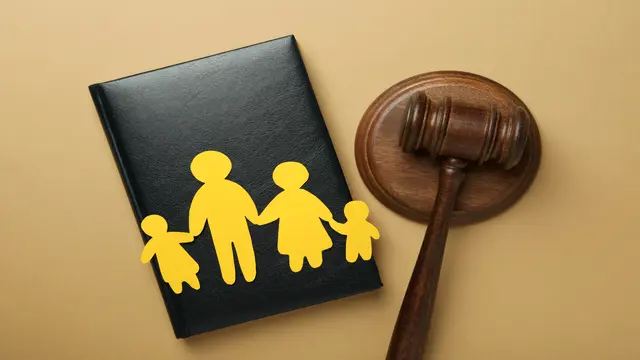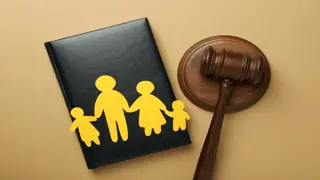
Family Law Level 3 Advanced Diploma
Update on 2023 | CPD Certified | Free Digital Certificate | Free Exam | Lifetime Access
Course Line On Demand
Summary
- Reed Courses Certificate of Completion - Free
- Tutor is available to students
Add to basket or enquire
Overview
Welcome to Family Law Level 3 Advanced Diploma, a comprehensive and engaging course designed to provide you with in-depth knowledge and practical skills in Family Law. Throughout this course, we will explore various aspects of Family Law and delve into its fundamental concepts, advanced techniques, and real-world applications.
Our primary objective in Family Law Level 3 Advanced Diploma is to equip you with a solid foundation in Family Law. Whether you are a beginner or an experienced professional looking to expand your expertise, this course will cater to your needs and help you achieve your learning goals.
During our journey together, you will have the opportunity to:
- Gain a thorough understanding of the core principles and theories that underpin Family Law.
- Acquire practical skills through hands-on exercises, projects, and real-world examples.
- Explore cutting-edge advancements and emerging trends in the field of Family Law.
- Prepare for future opportunities, such as further education, career advancement, or entrepreneurship, in the field of Family Law.
- Reflect on your learning journey, celebrate your achievements, and gain the confidence to excel in Family Law.
By the end of Family Law Level 3 Advanced Diploma, you will have gained a comprehensive understanding of Family Law and developed the skills necessary to succeed in this dynamic field. Whether you choose to pursue further education, enter the job market, or embark on entrepreneurial ventures, this course will lay a strong foundation for your future endeavours.
We are excited to have you join us on this educational journey, and we look forward to helping you unlock your full potential in Family Law Level 3 Advanced Diploma. Let's get started!
Why should you choose Course Line?
When it comes to quality education and professional development, Course Line stands out as one of the most prestigious learning providers. As a certified institution by UKRLP & CPD Group, we have a proven track record of excellence, having successfully taught over 20,000+ students and counting.
Certificates
Reed Courses Certificate of Completion
Digital certificate - Included
Will be downloadable when all lectures have been completed.
Curriculum
-
Disclaimer 01:00
-
Module 1: Introduction to Family Law 11:00
-
Module 2: Framing 08:00
-
Module 3: Marriage 08:00
-
Module 4: Civil Partnership and Cohabitation 11:00
-
Module 5: Nullity in Marriage 08:00
-
Module 6: Divorce 06:00
-
Module 7: Child Custody 05:00
-
Module 8: Property and Finance on Divorce 07:00
-
Module 9: Child Support 10:00
-
Module 10: Adoption Process 11:00
-
Module 11: Domestic Violence 06:00
-
Module 12: Gender Equality 09:00
-
Module 13: Feminist Perspective 10:00
-
Assessment 10:00
Course media
Description
Welcome to the course outline for Family Law Level 3 Advanced Diploma. In this comprehensive learning journey, we will explore the depths of Family Law, delving into its core principles, practical examples, and advanced techniques. Through a series of engaging lectures and exercises, you will gain the knowledge and skills necessary to excel in the field of Family Law Level 3 Advanced Diploma.
*****Family Law Level 3 Advanced Diploma Course Syllabus*****
Module 1: Introduction to Family Law
- Concept of Family
- What Is Family Law?
- The Changing Face of Family Law
- How Family Law Differs from Civil Litigation?
- The Function of Family Law
- Family Law and Human Rights
Module 2: Framing
- Personal Obligations
- Basic Values and Family Law
- Family and Friendship Values
- Traditional Family Values
- Family Law’s Doctrines
Module 3: Marriage
- Development of Marital Laws
- Formalities of Marriage
- The Marriage Ceremony
- Registration
- Consent
Module 4: Civil Partnership and Cohabitation
- Civil Partnership
- Who Can Enter a Civil Partnership?
- Forming a Civil Partnership
- Pre-Registration Agreements
- Annulling a Civil Partnership
- Ending a Civil Partnership
- Differences between Civil Partnership and Marriage
- Unmarried Cohabiting Couples
Module 5: Nullity in Marriage
- Nullity
- Types of Marriage
- Grounds on which a Marriage Is a Void
- Annulling Voidable Marriages
- Comparison of Void and Voidable Marriages
- Relationship between Nullity and Divorce
Module 6: Divorce
- A Historical Perspective
- The Basic Presumptions of Modern Divorce
- The Grounds for Divorce
- Causes of Divorce
- The Divorce Process
Module 7: Child Custody
- Introduction to Child Custody
- Children Act Proceedings
- Who Gets the Custody?
- Child Custody and Access
- Joint Residency
- Custody Disputes
Module 8: Property and Finance on Divorce
- Concept of Maintenance
- Financial Orders
- Property Orders
- The Statutory Criteria
- Court’s Considerations
- Financial Needs, Obligations and Responsibilities
Module 9: Child Support
- Child Support
- Determining Child Support
- Parental Responsibility
- Qualifying Child
- The Child Support Agency
- The Child Support Act 1991
- Child Support Acts 1991-95 as Amended
- Children with Exceptional Needs
Module 10: Adoption Process
- What Is Adoption?
- Who Is Adopted?
- Who Can Be Adopted?
- Who Can Adopt?
- Who Can Arrange Adoption?
- The Making of Adoption Order
- Parental Orders
- The Welfare of the Child
- Surrogacy
Module 11: Domestic Violence
- What Is Domestic Violence?
- Forms of Abuse
- The Incidence of Domestic Violence
- Impact of Domestic Violence on Children
- Causes of Domestic Violence
- The Development of the Law on Domestic Violence
- Injunctions and Orders Under the Family Law Act 1996
Module 12: Gender Equality
- Introduction to Gender Equality
- Gender, Rights, Responsibilities and Social Policy
- Work, Parental Responsibilities, and Gender Equity
- Child Protection, Gender, and Rights
- Public Norms and Private Lives
Module 13: Feminist Perspective
- Feminism and Families
- Issues in Family Law Concerning Feminism
- Feminist Contributions to Family Law
- Decisions about Becoming a mother
- Feminism on Domestic Violence
Assessment Process
Upon completing the Family Law Level 3 Advanced Diploma course, you will be required to undertake a multiple-choice evaluation in order to gauge your understanding of the material covered.
If you do not achieve the minimum passing score, you will have the opportunity to retake the assessment without incurring any additional cost.
Certification
After successfully completing this Family Law Level 3 Advanced Diploma course, you will get an instant Free digital certificate.
Who is this course for?
Welcome to the course outline for Family Law Level 3 Advanced Diploma. In this comprehensive learning journey, we will explore the depths of Family Law, delving into its core principles, practical examples, and advanced techniques. Through a series of engaging lectures and exercises, you will gain the knowledge and skills necessary to excel in the field of Family Law Level 3 Advanced Diploma.
*****Family Law Level 3 Advanced Diploma Course Syllabus*****
Module 1: Introduction to Family Law
- Concept of Family
- What Is Family Law?
- The Changing Face of Family Law
- How Family Law Differs from Civil Litigation?
- The Function of Family Law
- Family Law and Human Rights
Module 2: Framing
- Personal Obligations
- Basic Values and Family Law
- Family and Friendship Values
- Traditional Family Values
- Family Law’s Doctrines
Module 3: Marriage
- Development of Marital Laws
- Formalities of Marriage
- The Marriage Ceremony
- Registration
- Consent
Module 4: Civil Partnership and Cohabitation
- Civil Partnership
- Who Can Enter a Civil Partnership?
- Forming a Civil Partnership
- Pre-Registration Agreements
- Annulling a Civil Partnership
- Ending a Civil Partnership
- Differences between Civil Partnership and Marriage
- Unmarried Cohabiting Couples
Module 5: Nullity in Marriage
- Nullity
- Types of Marriage
- Grounds on which a Marriage Is a Void
- Annulling Voidable Marriages
- Comparison of Void and Voidable Marriages
- Relationship between Nullity and Divorce
Module 6: Divorce
- A Historical Perspective
- The Basic Presumptions of Modern Divorce
- The Grounds for Divorce
- Causes of Divorce
- The Divorce Process
Module 7: Child Custody
- Introduction to Child Custody
- Children Act Proceedings
- Who Gets the Custody?
- Child Custody and Access
- Joint Residency
- Custody Disputes
Module 8: Property and Finance on Divorce
- Concept of Maintenance
- Financial Orders
- Property Orders
- The Statutory Criteria
- Court’s Considerations
- Financial Needs, Obligations and Responsibilities
Module 9: Child Support
- Child Support
- Determining Child Support
- Parental Responsibility
- Qualifying Child
- The Child Support Agency
- The Child Support Act 1991
- Child Support Acts 1991-95 as Amended
- Children with Exceptional Needs
Module 10: Adoption Process
- What Is Adoption?
- Who Is Adopted?
- Who Can Be Adopted?
- Who Can Adopt?
- Who Can Arrange Adoption?
- The Making of Adoption Order
- Parental Orders
- The Welfare of the Child
- Surrogacy
Module 11: Domestic Violence
- What Is Domestic Violence?
- Forms of Abuse
- The Incidence of Domestic Violence
- Impact of Domestic Violence on Children
- Causes of Domestic Violence
- The Development of the Law on Domestic Violence
- Injunctions and Orders Under the Family Law Act 1996
Module 12: Gender Equality
- Introduction to Gender Equality
- Gender, Rights, Responsibilities and Social Policy
- Work, Parental Responsibilities, and Gender Equity
- Child Protection, Gender, and Rights
- Public Norms and Private Lives
Module 13: Feminist Perspective
- Feminism and Families
- Issues in Family Law Concerning Feminism
- Feminist Contributions to Family Law
- Decisions about Becoming a mother
- Feminism on Domestic Violence
Assessment Process
Upon completing the Family Law Level 3 Advanced Diploma course, you will be required to undertake a multiple-choice evaluation in order to gauge your understanding of the material covered.
If you do not achieve the minimum passing score, you will have the opportunity to retake the assessment without incurring any additional cost.
Certification
After successfully completing this Family Law Level 3 Advanced Diploma course, you will get an instant Free digital certificate.
Requirements
Requirements for the Family Law Level 3 Advanced Diploma course:
- No Prior Knowledge Required
- Basic Computer Skills.
- Internet access.
- Familiarity with English
Career path
Completing Family Law Level 3 Advanced Diploma course can open exciting career opportunities in various fields related to Family Law. Here are three potential career paths you can pursue after completing Family Law Level 3 Advanced Diploma:
- Family Law Specialist
- Family Law Researcher
- Family Law Educator
Questions and answers
Currently there are no Q&As for this course. Be the first to ask a question.
Reviews
Currently there are no reviews for this course. Be the first to leave a review.
Legal information
This course is advertised on reed.co.uk by the Course Provider, whose terms and conditions apply. Purchases are made directly from the Course Provider, and as such, content and materials are supplied by the Course Provider directly. Reed is acting as agent and not reseller in relation to this course. Reed's only responsibility is to facilitate your payment for the course. It is your responsibility to review and agree to the Course Provider's terms and conditions and satisfy yourself as to the suitability of the course you intend to purchase. Reed will not have any responsibility for the content of the course and/or associated materials.


